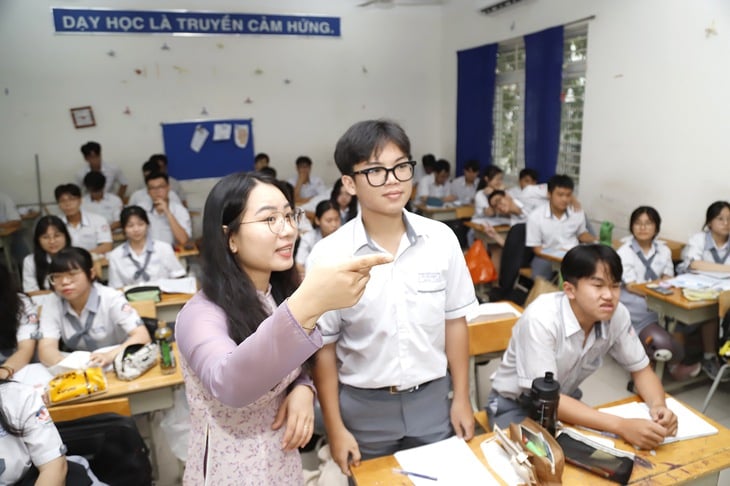It is necessary to aim for positive student education , however, according to many teachers, "strong measures" are still needed. In the photo: Teachers and students of Vo Van Kiet High School, District 8, Ho Chi Minh City in a class - Photo: ANH KHOI
As reported by Tuoi Tre Online , the draft circular regulating rewards and discipline for students of the Ministry of Education and Training is being consulted to replace the circular guiding the rewards and discipline of students in general schools issued by the ministry in 1988.
Accordingly, the three disciplinary measures for students at secondary schools, high schools, and continuing education centers include: level 1 is warning, level 2 is criticism, and level 3 is requiring students to write a self-criticism.
These disciplinary measures replace the five previous forms of discipline: class reprimand, school disciplinary council reprimand, school-wide warning, one-week expulsion, and one-year expulsion.
The draft has generated much discussion regarding student education in schools. To add another perspective, reader Thanh Nguyen - who has worked for many years as a homeroom teacher at a secondary school - shared the following article.
What do teachers rely on to correct students in response to self-criticism?
Today's generation of students grows up in a context of multidimensional social influences, accepting the good and approaching the negative aspects of a hedonistic, violent, and virtual lifestyle...
During many years of directly educating students as a homeroom teacher, I encountered countless deviant behaviors and violations of school regulations.
Even involved in regulations related to electronic cigarettes, illegal motorbike riding, school violence.
Reports and self-criticisms still appear regularly in weekend class activities.
There are some self-criticisms that I still keep, as a memory between teacher and student because I was so impressed with the way the students realized their mistakes and determined to correct their behavior.
And there are also countless self-criticisms written as a way of coping, writing today, then continuing to make mistakes next week.
Self-criticism will be the highest form of discipline for middle and high school students according to the draft circular regulating rewards and discipline for students.
Many people fear that it is not enough of a deterrent against systemic violations that cause serious consequences. This concern is completely justified.
Students who are lazy to study need to have their attitudes corrected. Students who are rude, disruptive, and hit their friends also need to have their behavior adjusted.
But almost all forms of punishment in schools are now limited to reminders, criticism, and requests to write self-criticisms - even criticizing students in front of the flag or in front of the class has been eliminated.
That is to say, schools need more specific and comprehensive legal bases to handle student violations; teachers need a fulcrum to carry out the mission of teaching literacy and educating people.
Students need tolerance
Abolishing the disciplinary measure of suspension for students who violate the law is a humane approach because children are still protected in the school environment; given the opportunity to reflect and recognize their mistakes; listened to, understood and given the opportunity to correct their mistakes.
This is in line with the positive discipline trend that modern education is aiming for.
Suspension from school will unintentionally push unstable children away from the arms of teachers and friends. Life outside the school gate is full of potential pitfalls, making it easier for children to slip and fall.
Students are still growing children and have shortcomings in awareness, attitude, and behavior. Therefore, they need adults to accompany, talk, understand, and share to have the opportunity to reflect on mistakes and correct them.
During my years of teaching, I rarely witnessed students leaving school with the most severe disciplinary decision.
A great help to the journey of moral education of students is the companionship and support from the students' parents.
I am lucky to meet parents who sympathize and share the pressure of the teaching profession, accompany and support teachers a lot when students violate the rules.
Parents' goodwill is a big plus for teachers to enthusiastically shape and adjust students' awareness and behavior.
Chat, ask, discuss and guide students to reflect on their mistakes.
Punish students with sanitation and community service to give them a chance to correct their mistakes. Read books, write reflections, practice lessons of solidarity and love for friends through specific activities...
We are applying all of these solutions to impact children's awareness and change their behavior.
Educating people is an art. There is no single script. No two lesson plans are exactly the same.
For each student, teachers need to be flexible and adaptable in applying different teaching methods.
Most importantly, it comes from love for students, patience and tolerance, hoping that teachers will be able to influence students with gentleness in words and sincerity in caring and correcting actions.
Because education is teaching and educating!
Read moreBack to Topic Page
THANH NGUYEN
Source: https://tuoitre.vn/hoc-sinh-hut-thuoc-la-dien-tu-bao-luc-hoc-duong-viet-ban-kiem-diem-co-du-suc-ran-de-20250512110013921.htm



































































































Comment (0)